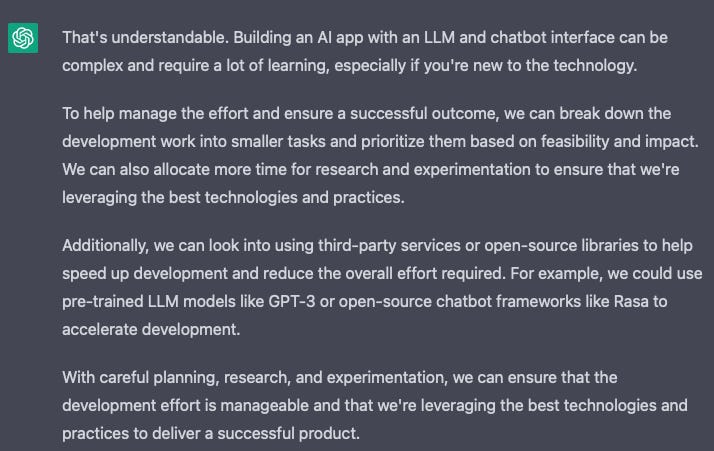In 2024 AIs will prompt you
or how AIs will begin to augment your life
Generative AI applications, such as ChatGPT, Stable Diffusion, and Midjourney, currently require user prompts to initiate interaction. Prompt design, particularly in generative art, is an art form, but its importance is diminishing as models grow more capable.
"Copilot" applications, such as GitHub Copilot, aim to assist users, but still require direction. As models improve, people adapt to AI workflows, and developers refine AI-driven UX, this will evolve.
A bold shift is on the horizon: as applications evolve, AI agents will take the initiative, prompting humans themselves. This change may appear subtle, since the interaction continues to be conversational. However, users will now approach these interactions with a specific objective in mind, and the AI will play a more active role in guiding them towards achieving a particular action or goal.
To this end, I’ve already found ChatGPT great at prompting. For example, you can ask it to assume the role of a product manager:
And it does an amazing job of remaining flexible, while pushing towards the original goal:
Future developments may involve AI agents persisting context, enabling more personalized interactions based on previous encounters and objectives. An agent will remember more about you, and what you’re trying to achieve.
With GPT-4, this shift is especially evident in educational applications:
In addition to education, several domains are poised to benefit from proactive AI agents, including:
Productivity: AI agents can help break down complex projects and motivate users towards completion.
Coaching: Agents can provide holistic advice based on career or personal goals.
Advisory Services
Legal
Real Estate
Financial
While these agents won't replace human expertise, they will help guide individuals towards their goals. For example, a personal finance agent might suggest opening a retirement account based on one's savings rate, still requiring consultation with a financial professional. This approach is more personalized and user-friendly than existing applications.
As AI technology improves and becomes more influential in our daily lives, people will need to adapt to relying on AI agents for guidance. Initially, some individuals may find this uncomfortable or awkward, but as AI agents demonstrate their efficacy and their use becomes normalized, attitudes towards them will likely shift. This shift in behavior is comparable to the widespread adoption of smartphones and constant connectivity, which has become the norm, to the point where being "off the grid" or "offline" is noteworthy.
The AI revolution is undeniably upon us, and its impact on our lives will only grow more profound. The rise of AI agents that can initiate interaction, remember context, and provide tailored guidance will bring forth a new era of collaboration between humans and technology, ultimately empowering individuals to reach their goals more effectively.






